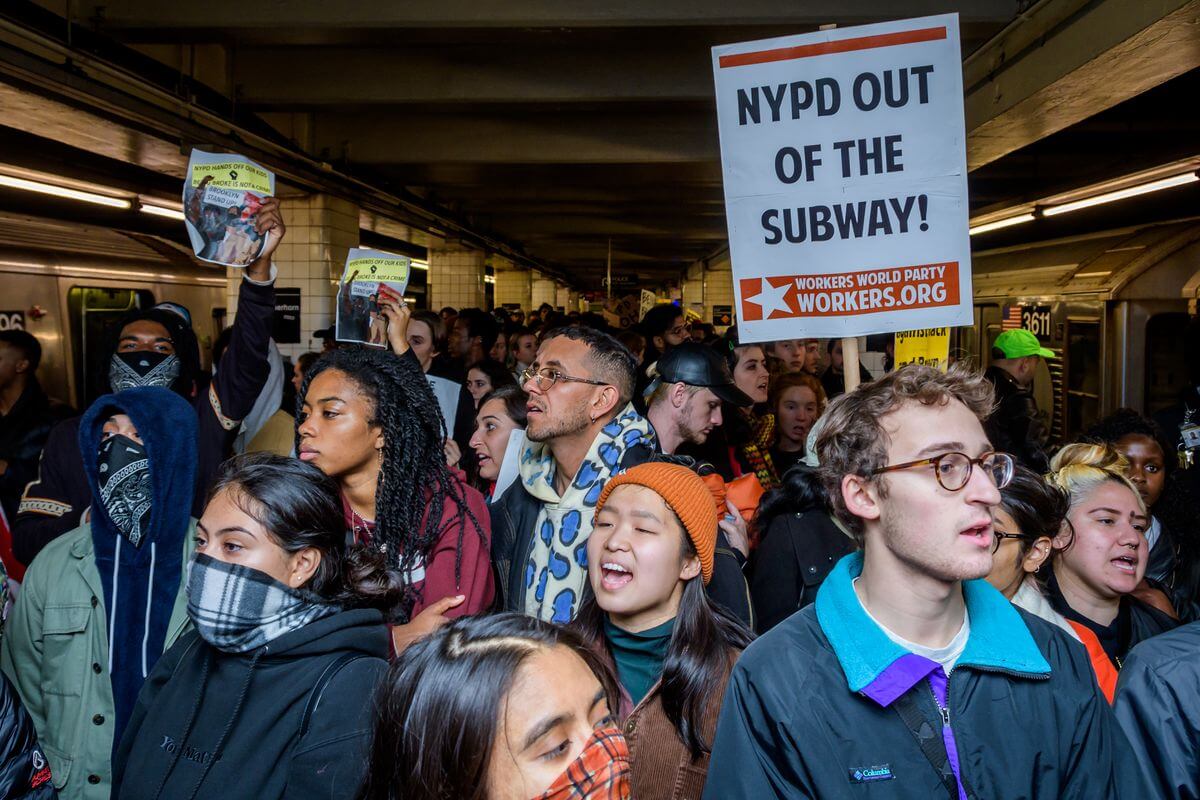
“…because heedless empathy for the worst among us is currently leading us on the downward-sloping path to mediocrity and beyond.”
Most of us may not realize it as yet, but we are now locked in an existential battle, with our very culture and civilization on the line. On one side are all the people of every race, class, religion, gender and sexual orientation who want to live in a safe, sane, orderly, productive, dynamic, and creative society that rewards talent, hard work, character, and grit. On the other side are thugs, bums, boors, law-breakers, rule-flouters, responsibility-shirkers, couch-surfers, space-wasters, and freeloaders. By all rights, this should be a case of no-contest. There is but one problem: the second group has the most powerful and influential elites in politics, media, academia, and the entertainment industry on its side. Many among these elites are precisely those who were handed their high-flown perches as a result of inherited privilege—familial wealth and connections, legacy admissions and so on—and, wracked by guilt in holding onto something they didn’t earn, work out their personal psychodramas by posturing themselves as opponents of the system that made them what they are. They hold together and command a ragtag coalition of disparate identity groups, including people with entirely divergent economic interests, under the “progressive” umbrella by drumming up a seemingly endless series of fake panics and crises—#MeToo and patriarchy, #BlackLivesMatter, white supremacy and white privilege, cultural appropriation, transphobia, Islamophobia, Donald Trump, a crackdown on all immigrants and so on—to which the appropriate reaction is inevitably some species of outrage and hysteria. In the process, they are ruining this country for the rest of us.
The New York subways are a microcosm of how this culture war is playing out. As someone who has never owned a car, hardly ever uses cabs, Ubers, etc. and takes subways and buses at all times of day and night, I have observed the same thing remarked on by many other straphangers: behavior in our public transportation system is totally out of control. People are routinely taking up multiple seats and putting their dirty feet up on seats as if they were in their own living rooms. More people than ever cannot be bothered to use headphones to listen to their tunes. Speaking volume keeps on getting louder. We are being bombarded by loud and proud profanity-laced music and dialogue. At my local stop, operating with seeming impunity, the same two or three ne’er-do-wells break the MetroCard vending machines on an almost daily basis and hover by the turnstiles to sell swipes. Overlapping waves of panhandlers—the same bums, junkies and winos day in and day out, spinning out the same worn-out yarn about how they are out-of-work veterans just trying to scramble together another $2.13 to buy a sandwich—are working their way through the subway cars.
Most obviously, ever since Mayor Bill de Blasio took it upon himself, elevating a narrow SJW conception of civil rights over the broader and more basic human right to a safe city, to end broken windows policing, disempower law enforcement, and unleash the homeless upon the city, our streets and our public spaces—but especially our subway trains and stations—are being deluged. Predictably, with the number of homeless in the subway up a whopping 23% over last year, service disruptions caused by the homeless making trouble are also way up, from 254 a decade ago to 856 in 2018 and on pace to shatter that record by as much 50% in 2019. These “incidents,” of course, do not encompass those quality of life issues — let’s call them hygienic disruptions to service—that can make entire train cars uninhabitable, especially in the dead of winter at night, when the E train (which stays underground and, therefore, warm all along its route), also known as “The Homeless Express,” sometimes carries as many as 70 homeless people on board (which, with 11 cars per train, breaks down to between six and seven in every car). Mayor de Blasio’s emasculated officers of the law, as The New York Times reports, are permitted to do no more than ask if homeless people on the trains would like to go to a shelter, only to be met with predictable resounding no’s.
The latest issue that has surfaced in this subway turf war in which paying customers appear to be waging a losing battle against hobos and derelicts, with their many friends in high places, is, of all things, what should be the ostensibly open and shut matter of turnstile jumping…as in, jumping over or crawling under the gate that keeps non-paying customers out of the system. In early 2018, in a move even would-be underclass champion Bill de Blasio condemned, Manhattan’s District Attorney Cy Vance announced that his office would no longer prosecute turnstile jumpers. The premise was that such arrests disproportionately target low-income and minority residents.
Needless to say, the overwhelming majority of low-income and minority residents pay their fares just like everyone else. These communities are just as interested as the rest of us—and probably more interested, since crime disproportionately afflicts poor and minority neighborhoods—in a safe, orderly and hygienic subway system. The people targeted when we arrest fare-beaters are not low-income and minority residents; rather they are low-character and criminal elements, regardless of their race or income bracket. It does not take anything more than a bare minimum of common sense to comprehend that people who are willing to jump turnstiles to evade fares are the very same people willing to defy other laws and norms and wreak havoc in our subway system. They are the same people harassing riders, blasting music out loud, panhandling, smoking on trains, riding between cars, breaking MetroCard machines, taking up residence, urinating and defecating in trains and stations, and generally making the subway unpleasant, unsanitary, uncivilized, and unsafe. It is a point proven—before the issue of broken-windows policing got politicized by opportunistic hatemongers—by former New York City Police Commissioner William J. Bratton, when his crackdown on low-level subway crimes of this sort resulted in a 13% drop in serious subway crime in 1991.
By June 2019, with The New York Times acknowledging in the meantime that subway fare evasion was skyrocketing, even New York’s liberal governor had had enough of the madness in the metro. Governor Cuomo put Bratton’s time-tested strategy back to work, directing an influx of cops back into the subway system to tackle turnstile jumpers and other miscreants. But not long after law enforcement started doing its work, the progressive left freak-out began. Nick Martin, a New Republic staff writer whose listed articles say all you need to know about his deranged identity politics, celebrated Halloween 2019 by costuming his prose published on that day in the attire of a subway Robin Hood, penning a piece that suggested that “[t]he influx of police officers into New York’s subway system is part of a broader criminalization of poverty” and embedded tendentiously described clips like this one, which, to my eyes, shows a bunch of standoffish and violent thugs making life hell for the NYPD.
Shortly thereafter, a small mob of profane, anti-cop protesters (similar in spirit to the kinds of people who’d doused cops in water back in July) performed a mass turnstile jumping stunt and, reminding all New Yorkers old enough to recall the dangerous, defaced pre-Giuliani subway system of the 1980’s, graffitied up the walls of a stop in Downtown Brooklyn with anti-cop drivel of every sort. Enter, on cue, entitled liberal elite poster child Alexandria Ocasio-Cortez. Everyone’s favorite talk-before-you-think Congresswoman jumped into the fray to opine on the protests, offering support to the marauding mob and perpetuating the myth that people who don’t pay the subway fare are doing so due to poverty rather than thuggery: “[a]rresting people who can’t afford a $2.75 fare makes no one safer and destabilizes our community,” she said. Protests by these small and unrepresentative bands of boors have continued since then.
…if people jump turnstiles because they are poor, might poverty not also drive them to dodge highway tolls, steal food off grocery store shelves, and hold up convenience stores for an extra bit of pocket change; in fact, isn’t the very notion of charging the same prices to rich and poor alike a kind of regressive tax that hurts the poor?
To be clear, even de Blasio has been honest enough to acknowledge that there is “no evidence” that turnstile jumping is something people are driven to do by any inability to pay the fare. Moreover, people like Ocasio-Cortez, Nick Martin, and the others pushing the poverty theory of the case are standing at the edge of a very slippery slope down which we as a nation are already beginning to careen: if people jump turnstiles because they are poor, might poverty not also drive them to dodge highway tolls, steal food off grocery store shelves, and hold up convenience stores for an extra bit of pocket change; in fact, isn’t the very notion of charging the same prices to rich and poor alike a kind of regressive tax that hurts the poor? And might not the day-to-day frustrations of poverty lead people to act out and commit understandable acts of violence against individuals and institutions in protest against the system? Why not completely decriminalize poverty-and-frustration-induced robbery and violence? The answer, beyond the obvious one, is that if we are going to decriminalize anything, any such decision should be made by voters and take the form of laws and repeals of laws duly enacted by elected representatives, not by mobs of protesters, elite journalists or renegade district attorneys like Cy Vance or San Francisco’s new D.A. Chesa Boudin (who has already pledged not to prosecute quality-of-life crimes like public urination) refusing to enforce laws that are on the books.
The goings-on on the New York subway are, as I have already said, just a microcosm. The macrocosm includes our society’s growing penchant to attack all forms of law, order, civility, and even the ideal of merit itself.
Instead of combatting criminals and taking on the causes of their criminality, for example, we have, instead, been flailing at the specter of “criminalization” on the empirically discredited premise that our criminal justice system targets African Americans. While I am not a particular fan of making crimes out of low-level drug possession or prostitution, we should be under no illusions that decriminalizing classic kinds of “victimless” crimes is going to do much to change the racial complexion of the criminal justice system. First, the overwhelming majority of people in prison are violent criminals and serial thieves, and of those imprisoned for drug-related offenses, dealers far outnumber mere “possessors.” Second, when we look at crime statistics by race, it turns out that the racial disparities get worse as the crimes get more violent. While blacks (about 13% of the population) account for 28% of all crimes committed, they account for 38.5% of violent crimes and a whopping 49.4% of homicides. Thus, unless we are prepared to decriminalize violent crimes and murders, we are not going to get far in a “decriminalization” approach to the crusade for racial justice.
Along similar lines, facing increasing economic inequality and a job market that is increasingly automating away low-skill jobs, prominent politicians on the Left—instead of prioritizing merit-based admission of the kinds of highly educated and highly skilled legal immigrants who might be well-positioned to contribute to our economy and thrive in this competitive marketplace—appear to be moving in the exact opposite direction, refusing to go along with a merit-based system and, instead, proposing programs that would decriminalize border crossings, allow low-skilled illegal immigrants to cut in line (in which would-be-legal immigrants have been waiting patiently) and, what is more, receive various benefits on equal terms with American citizens. This would, of course, reward illegal border crossing and result in an unabated flood of immigrants we could not possibly accommodate, while increasing income inequality still further.
The opposition to merit-based immigration should not surprise us in light of the fact that the very concept of merit itself is under attack. Books released in recent years, such as Yale Law School professor Daniel Markovits’ The Meritocracy Trap or University of London sociologist Jo Littler’s Against Meritocracy, avail themselves of real problems with our current system as implemented but look past even those problems to go at the essential principle of “merit” at the root of the system. Mayor de Blasio and his radical schools chancellor, Richard Carranza, have taken on the very concept of gifted programs intended to offer better educational opportunities to deserving children. Elite universities have rejiggered their already opaque admissions criteria to focus still less on concrete, measurable metrics of achievement and more on ephemeral, subjective dimensions, such as community service. High-profile politicians vying for the Democratic Party’s nomination for the Presidency are taking cheap shots at those innovators, trailblazers, and grinders who have built up businesses that made them into multi-millionaires and billionaires.
These sea changes in how we view those at the bottom of our social hierarchy (turnstile jumpers and other criminals, the homeless, illegal immigrants, etc.) and those at the top (smart, talented, hard-working, high-achieving kids and adults alike) are part of a single, disturbing picture that the philosopher Friedrich Nietzsche vividly painted for us over a century ago in his Genealogy of Morals (1887). Anyone who has taken even an introductory philosophy course might have run into Nietzsche’s metaphor of “slave morality,” a sick society’s inversion of the normal order of things: the cream, instead of rising to the top, is guilted, shamed and shunted to the bottom by the resentful masses and their elite acolytes. Writes Nietzsche, in a passage worth quoting at length for its precise anticipation of our cultural moment:
“The invalids are the great danger to humanity—not the evil men, not the ‘predatory animals.’ Those people who are, from the outset, failures, oppressed, broken—they are the ones, the weakest, who most undermine life among human beings, who in the most perilous way poison and question our trust in life, in humanity, in ourselves….They wander around among us like personifications of reproach, like warnings to us, as if health, success, strength, pride, and a feeling of power were inherently depraved things, for which people must atone some day, atone bitterly. How they thirst to be hangmen! Among them there are plenty of people disguised as judges seeking revenge. They always have the word ‘Justice’ in their mouths, like poisonous saliva, with their mouths always pursed, constantly ready to spit at anything which does not look discontented and goes on its way in good spirits….They are all men of resentment, these physiologically impaired and worm-eaten men, a totally quivering earthly kingdom of subterranean revenge, inexhaustible, insatiable in its outbursts against the fortunate, and equally in its masquerades of revenge, its pretexts for revenge. When would they attain their ultimate, most refined, most sublime triumph of revenge? Undoubtedly, if they could succeed in pushing their own wretchedness, all misery in general, into the consciences of the fortunate, so that the latter one day might begin to be ashamed of their good fortune and perhaps would say to themselves, ‘It’s shameful to be fortunate. There’s too much misery!'”
This is the toxic rot of social justice warrior ideology in a nutshell. It is an ideology that, in the guise of extending empathy to those deemed the most “vulnerable,” elevates idlers and criminals over the working poor and middle class, the squeaky wheel over the functional one, parasites over contributors, the worst over the best. It is an ideology that we must oppose at every turn, at all costs, if we as a society hope to survive.
A society that no longer rewards merit is a society that is itself meritless. As Thomas Carlyle wrote, “No sadder proof can be given by a man of his own littleness than disbelief in great men.”
We’ve had enough empathy—not just because, as a recent study showed, people highest in empathy are also highest in hostility towards those with whom they disagree, nor, even, because, as Yale psychologist Paul Bloom argued in his 2016 book Against Empathy, what we need is not empathy but “rational compassion,” but rather, because heedless empathy for the worst among us is currently leading us on the downward-sloping path to mediocrity and beyond. A society that no longer rewards merit is a society that is itself meritless. As Thomas Carlyle wrote, “No sadder proof can be given by a man of his own littleness than disbelief in great men.” Sociologists speak sometimes of the concept of “patterns of prestige” that prevail in cultures, communities, or organizations. These are qualities and behaviors that are esteemed and rewarded. In a street gang, such patterns may include displays of toughness, ruthlessness, dominance, and street smarts. In a country club, prestigious qualities may include gentility, refinement, charm, chumminess, money, and connections. The point is that within the context of any association or society, individuals will tend to strive to acquire and display whatever is held in highest esteem. The more we reward idleness, weakness, victimhood, boorishness, thuggishness, vulgarity and criminality, the more these will be exactly what we get.
What we want and need is the opposite. We should be less concerned with criminalizing poverty than with stigmatizing prosperity. Here is a prediction: the more difficult, inconvenient and unpleasant we make homelessness, the fewer homeless people we will see. The more we stop, frisk, arrest, detain, and harass the homeless off of our streets and subways, the more we will channel the endless resourcefulness they currently deploy in figuring out how to stay and get by on the streets into the far more socially and personally useful goal of figuring out how to get off and stay off the streets. What appears, in the short term, to be gratuitous cruelty will, in the long term, turn out to be the most compassionate move for all involved, as Heather Mac Donald has documented in a recent data-driven analysis of San Francisco’s enabling of an even worse crisis of homelessness and general disorder. What we need, she writes, is, “[a] commitment to a single standard of behavior for all and an insistence that rights carry with them reciprocal responsibilities.”
To say it in one word, what we need is a crackdown—a crackdown on junkies, thugs, bums and criminals and all their filth, incivility and disorder of every sort, in every form. George W. Bush, who, despite his colossal blunder in Iraq and many other flaws as a President, was fond of a powerful phrase that has stuck with me: “the soft bigotry of low expectations.” Today, this species of bigotry is increasingly becoming our public policy, whether in our subways, on our streets or in our schools. Acting in no one’s benefit, least of all their own, the dumbed-down hordes are taking advantage of our misguided generosity. When we go low, they go lower. And we keep scrambling to catch up to them in a race to the bottom that no one can win. The solution is to expect better. The solution is excellence—to expect it, to demand it.
Alexander Zubatov is a lawyer in New York, as well as an essayist and poet.











I’m glad this author has been bold enough to express something lots of us are probably thinking. The elites are the ones who do a disproportionate amount of the talking, but most regular New Yorkers are sick and tired of dealing with this kind of crap. As a black man who lives in Bed-Stuy, I think I speak for most members of my community (not the activists but the regular folk) in saying that we want MORE policing, not less, MORE law and order, not less, and unfortunately, that message just isn’t getting out there because the anti-cop nuts (most of them white, but some black as well) that are claiming to speak for us are monopolozing the conversation.
Unfortunately in modern times, when you uphold law and order, when you preach decency and good manners to get along with people in society, you’re a moralist, a conservative (derogatory term), or even a reactionary. Everything was reversed, it seems that we live in the age of chaos exaltation.
Another red herring. Superficia andl.cliche ridden. It’s not that I disagree with what the author says or his Nietzschean interpretation. I understand. It’s just that at the moment the top is just as broken and unhinged as the bottom. Why isn’t the author as reppelled by the stink at the top of the pecking as he is by the stench of unclean bodies. Why aren’t you as repelled by the entitled arrogance of wealthy people avoiding paying the fees at the turnstile. They aren’t so much jumping over the turnstiles as they are just paying armies of lobyists and lawyers to circumvent or remove them altogether.Dig a little deeper and you’ll discover there is as much resentment at the top as there is at the bottom. It just wears a $5,000 wool suit and lives in gated community where it doesn’t have to be reminded how odious circumstances really are.
Thanks for your comment on my article. Just as you don’t disagree with what I wrote but simply think it’s not the full picture, I don’t disagree with what you wrote. I think there’s corruption at the top, and I’d actually previously published an essay elsewhere (https://theimaginativeconservative.org/2018/11/backwards-civilization-alexander-zubatov.html) that links up the two issues — the rot at the top and at the bottom — and aims to demonstrate how they’re interrelated. But here’s the thing: articles taking aim at the financial and political elites at the top are a dime a dozen (those people, of course, make easy targets for cheap shots). There are, however, not quite as many people willing to tackle, in an unflinching fashion, the awfulness, thuggishness and criminality proliferating at the bottom. More importantly, my real target in the article is not the people at the bottom themselves (homeless, junkies, thugs, etc., who probably aren’t sitting around reading MerionWest because they’re too busy sitting around doing nothing whatsoever), but rather, the elites that are enabling and egging on the crisis I’m describing. The kind of demand for merit/excellence that I’m saying we need to return to is a prescription for all of society, not just those at the bottom. While this nation is still doing far, far better than the overwhelming majority of nations on earth, there is no doubt that our political system is broken. Our financial system is broken. Our schools are broken. Our universities are broken. Our healthcare is broken. The details and the reasons are many, way beyond the scope of any one essay. But I’m addressing a problem that is very important as well, which is a crisis afflicting our quality of life on a daily basis, and really, a crisis of morale, of a civilization that no longer believes in itself. The recently deceased conservative philosopher Sir Roger Scruton called this “oikophobia,” which he defined as “the felt need to denigrate the customs, culture and institutions that are identifiably ‘ours.’” When we cease believing in ourselves, there’s no one else who’s going to step in and do it for us. We need to and can fix all the other stuff, but if we don’t fix our crisis of faith and start demanding excellence again, there’ll be nothing left worth fixing.
You kids, get off my lawn!
Don’t lawyers spend a lot of their time helping criminals? Hmm….
If there’s two types of people many Americans can regularly agree are some of the most dilettante, degenerate scum of society, it’s lawyers and artists, mr. poet. It’s ok tho. Plenty of people aren’t cut out for engineering – a real skill that requires talent, but also requires passing a math class or ten.
I think you’ve twisted Nietzsche words into something more class based than they are intended to be. For example, if a vagrant struggles everyday to overcome every norm society has ever tried to foist upon in an admantine quest to perfect his vagrancy, then this individual would be worthy of great esteem. The fact that some more urbane members of society may be bothered by the pungency of his will would be of no interest to Nietzsche.
I’d like to read an essay on the topic of “rational compassion” by an author who seemed compassionate and/or rational.
“My chosen group of excellent good people would never put me up against the wall, only the useless bad people, because it’s abundantly clear I’m also one of the excellent good people and the other people are the bad people.”